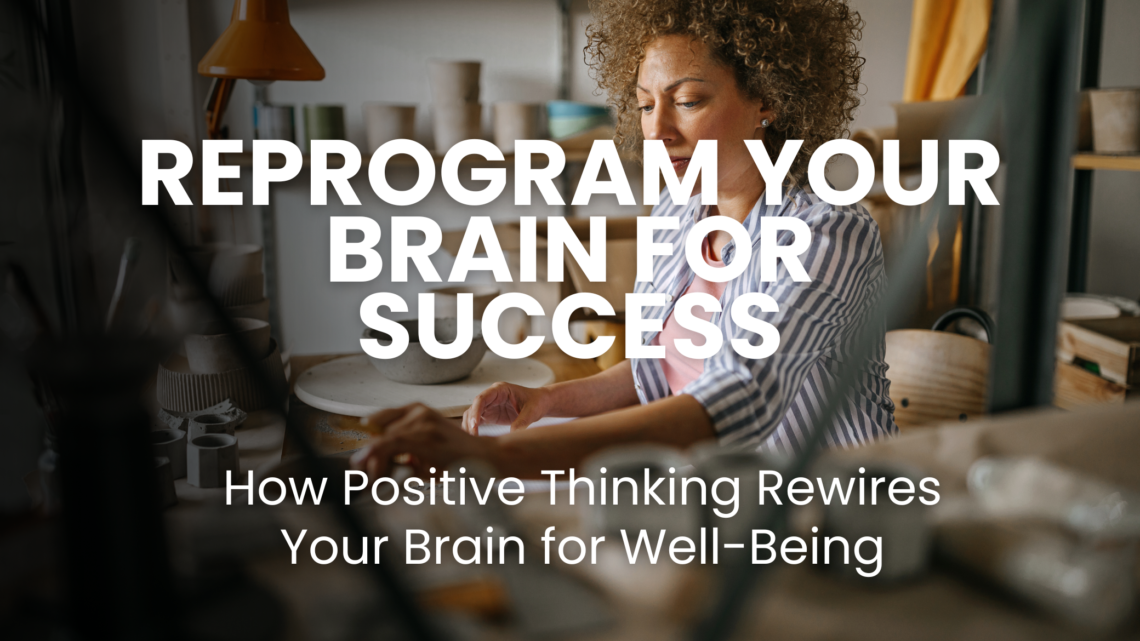For centuries, various cultures have incorporated positive self-talk practices into their traditions. But in recent years, science has begun to shed light on the powerful impact affirmations can have on our brains and overall well-being.
This blog post dives into the fascinating world of positive affirmations, exploring the scientific research that validates their effectiveness. We’ll uncover how repeating positive statements can reprogram your neural pathways, boost your self-esteem, and lead to a more positive and resilient mindset.
From Self-Help to Self-Science: Understanding Affirmations
Affirmations are positive statements that aim to counteract negative self-beliefs and cultivate a more optimistic outlook. They can be specific to a goal (“I am capable of achieving my fitness goals”) or focus on general well-being (“I am worthy of love and happiness”).
The concept might seem like mere self-help fluff, but research suggests there’s real power behind the practice. Self-affirmation theory, proposed by psychologists Claude Steele and Joshua Aronson, posits that reminding ourselves of our core values and strengths provides a psychological buffer in the face of threats or challenges .
How Affirmations Reshape Your Brain: The Neuroscience Connection
Our brains are constantly adapting, and affirmations can play a significant role in shaping this neuroplasticity. When we repeat positive statements, we activate specific neural pathways. Over time, these pathways become stronger, making positive thoughts and self-beliefs more readily accessible.
Studies using fMRI technology have shown that affirmations activate brain regions associated with self-processing, reward, and motivation. For example, research by Cascio et al. (2016) found increased activity in the ventromedial prefrontal cortex, a region involved in positive self-evaluation, when participants engaged in self-affirmation tasks.
Think of your brain like a garden. Negative self-talk is like planting weeds that crowd out healthy growth. Affirmations, on the other hand, are seeds for positive thoughts and beliefs. With consistent repetition, these affirmations can take root and flourish, transforming your mental landscape.
The Positive Power of Affirmations: Research-Backed Benefits
The science behind affirmations translates into a range of well-documented benefits:
- Reduced Stress and Anxiety: Studies have shown that affirmations can help activate the body’s relaxation response, lowering stress hormones like cortisol. This can lead to a calmer state of mind and improved coping mechanisms in challenging situations.
- Enhanced Self-Esteem: Repeating positive affirmations about your abilities and worth can combat negative self-criticism and boost your confidence. A study by Layous et al. (2017) found that self-affirmation interventions led to increased self-esteem in students.
- Improved Performance: Research suggests that affirmations can enhance motivation and goal achievement. A study by Sherman et al. (2009) demonstrated that students who engaged in self-affirmation tasks before an exam performed better than those who didn’t.
- Greater Resilience: By promoting a positive outlook and self-belief, affirmations can equip you to bounce back from setbacks and challenges. This resilience is crucial for navigating life’s inevitable ups and downs.
Crafting Powerful Affirmations: A Practical Guide
Now that you understand the science behind affirmations, let’s explore how to craft and use them effectively:
- Personalize Your Statements: Generic affirmations can be helpful, but the most impactful ones are those that resonate with your personal goals and challenges.
- Focus on the Present and Future: Affirmations should be worded in the present or future tense, emphasizing your capabilities and potential. For example, instead of “I wasn’t good at public speaking,” say “I am becoming a confident and engaging speaker.”
- Keep it Positive and Believable: While affirmations should be aspirational, they shouldn’t feel like outright lies. Aim for statements that feel achievable and empower you to take action.
- Repeat Regularly: Consistency is key. Aim to repeat your affirmations several times a day, either silently or aloud, to solidify the positive neural pathways.
- Combine with Action: Affirmations are a powerful tool, but they work best when coupled with action towards your goals.
Here are some examples of well-crafted affirmations:
- “I am worthy of love and respect.”
- “I am capable of overcoming challenges.”
- “I am confident and resilient.”
- “I am open to learning and growth.”
- “I am attracting positive experiences into my life.”
- “I am capable of doing anything.”






Beyond Positive Thinking: A Word of Caution
While affirmations are a valuable tool, it’s important to maintain realistic expectations. They are not a magic bullet that will solve all your problems. Here are some additional points to consider:
- Addressing Underlying Issues: If you struggle with deep-rooted negative beliefs or self-worth issues, affirmations alone might not be enough. Consider seeking professional help from a therapist to address the root causes of these challenges.
- Acceptance Alongside Affirmation: Life involves setbacks and disappointments. Affirmations can help cultivate resilience, but it’s also important to practice self-acceptance and acknowledge negative emotions when they arise.
- Focus on Progress, Not Perfection: Don’t get discouraged if you don’t see immediate results. The goal is to create lasting positive change, which takes time and consistent effort. Celebrate small wins and focus on progress over perfection.
Affirmations in Action: Examples for Different Areas of Life
Here are some examples of how you can incorporate affirmations into various aspects of your life:
- Career: “I am a valuable asset to my team.” – “I am confident in my skills and abilities.” – “I am open to new opportunities for growth and advancement.”



- Relationships: “I am worthy of healthy and supportive relationships.” – “I communicate effectively and openly with loved ones.” – “I attract positive and loving people into my life.”



- Health and Wellness: “I am committed to making healthy choices for my body and mind.” – “I am strong and resilient.” – “I am worthy of feeling good about myself.”



- Personal Growth: “I am a lifelong learner.” – “I am open to new challenges and experiences.” – “I embrace mistakes as opportunities for growth.”



Remember, affirmations are a personal practice. Experiment with different approaches and find what works best for you.
The Final Word: Reprogramming Your Mind for Well-Being
The science behind affirmations is clear: these positive statements have the power to reshape your brain, boost your self-esteem, and cultivate a more positive and resilient mindset. By incorporating affirmations into your daily routine, you’re actively participating in rewiring your brain for well-being and success.
So, take a deep breath, choose an affirmation that resonates with you, and start the journey towards a brighter and more fulfilling life. Remember, the power to change your mindset and ultimately your life lies within you.
Additional Tips for Enhancing the Power of Affirmations
This section can provide practical strategies to take your affirmation practice to the next level:
- Visualization: Combine affirmations with visualization techniques. Close your eyes and picture yourself achieving your goals or embodying the qualities you desire. This strengthens the neural pathways further by engaging multiple senses.
- Journaling: Write down your affirmations in a journal. The act of physically writing reinforces the positive statements and allows you to track your progress over time.
- Positive Self-Talk: Weave affirmations into your internal dialogue. Be mindful of your self-talk throughout the day and consciously replace negative thoughts with your chosen affirmations.
- Gratitude Practice: Gratitude goes hand-in-hand with affirmations. Expressing thankfulness for the good things in your life fosters a positive mindset and amplifies the effects of your affirmations.
- Community Support: Share your affirmation practice with like-minded friends or join online communities focused on positive thinking. Sharing your goals and experiences can provide valuable support and motivation.
Building a Sustainable Affirmation Habit
Making affirmations a permanent fixture in your life requires dedication and consistency. Here are some strategies to establish a sustainable affirmation habit:
- Start Small: Don’t overwhelm yourself. Begin with just one or two affirmations and gradually add more as you feel comfortable.
- Schedule Time: Dedicate a specific time each day, morning or evening, to repeat your affirmations. Consistency is key to neuroplasticity.
- Find Accountability: Tell a friend or family member about your affirmation practice. Having someone hold you accountable can be a powerful motivator.
- Make it Fun: Find ways to make your affirmations enjoyable. Repeat them while singing, dancing, or doing a physical activity you love.
- Track Your Progress: Keep a journal or use a mobile app to track your progress. Noting positive changes can keep you motivated and inspired.
Remember, affirmations are a journey, not a destination. Be patient with yourself, celebrate your wins, and enjoy the process of cultivating a more positive and empowered mindset.
Conclusion: Affirmations – A Powerful Tool for Personal Transformation
The science behind affirmations provides compelling evidence that these simple statements can significantly impact your brain, well-being, and overall success. By incorporating affirmations into your daily routine, you’re actively participating in shaping your mental landscape for the better.
So, embrace the power of positive self-talk, and embark on a journey of self-discovery and transformation. With dedication and consistent effort, affirmations can become a cornerstone of your personal growth and a catalyst for creating the life you desire.







